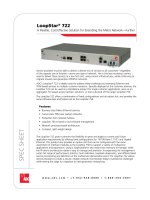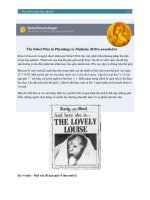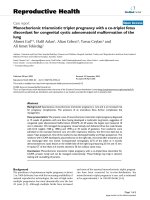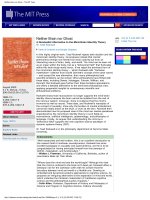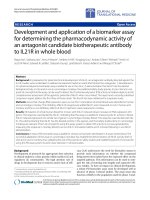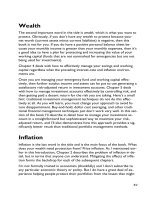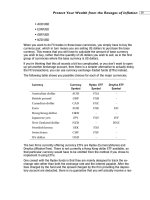UNIT3 READING
Bạn đang xem bản rút gọn của tài liệu. Xem và tải ngay bản đầy đủ của tài liệu tại đây (1.19 MB, 24 trang )
<span class='text_page_counter'>(1)</span><div class='page_container' data-page=1></div>
<span class='text_page_counter'>(2)</span><div class='page_container' data-page=2>
<b>Famous </b>
<b>Scientists</b>
<b>Louis Pasteur</b>
<b>Albert Einstein</b>
<b>Marie Curie</b>
</div>
<span class='text_page_counter'>(3)</span><div class='page_container' data-page=3>
<b>Louis Pasteur developed the vaccine for </b>
<b>preventing </b>
<b>rabies</b>
<b>.</b>
</div>
<span class='text_page_counter'>(4)</span><div class='page_container' data-page=4>
<b>Isaac Newton is famous for his </b>
<b>discovery of </b>
<b>gravity</b>
<b>.</b>
</div>
<span class='text_page_counter'>(5)</span><div class='page_container' data-page=5>
<b>Albert Einstein is famous for his special and </b>
<b>general </b>
<b>theories of relativity</b>
<b>.</b>
</div>
<span class='text_page_counter'>(6)</span><div class='page_container' data-page=6>
<b>Marie Curie determined the atomic </b>
<b>weight of </b>
<b>radium</b>
<b>.</b>
</div>
<span class='text_page_counter'>(7)</span><div class='page_container' data-page=7>
<b>Marie </b>
<b>Curie s </b>
’
</div>
<span class='text_page_counter'>(8)</span><div class='page_container' data-page=8>
<b>Unit 3:</b>
<b>Part A:</b>
<sub>READING</sub>
</div>
<span class='text_page_counter'>(9)</span><div class='page_container' data-page=9>
<i><b>UNIT 3</b></i>
:
<b>PEOPLE’ S BACKGROUND</b>
-
Reading
<b>1. Before you read:</b>
<b><sub>Ask and answer the questions.</sub></b>
<b>1. Can you name some scientists and their specialisations ?</b>
<b>2. Have you ever heard of Marie Curie?</b>
<b>3. What do you know about her?</b>
</div>
<span class='text_page_counter'>(10)</span><div class='page_container' data-page=10>
<i><b>UNIT 3</b></i>
:
<b>PEOPLE’ S BACKGROUND</b>
-
Reading
<b>2. While you read:</b>
<i><b>*New words:</b></i>
<b>-General education (n)</b>
<b>-Brilliant (a) </b>
<b>-Mature (a) </b>
<b>-Private tutor (n):</b>
<b>-Flying colours (a) :</b>
<b>-PhD (Doctor of Phylosophy) :</b>
<b>-Tragic death (n):</b>
<b>-Be awarded (a):</b>
<b>-Atomic weight of radium:</b>
<b>- Humanitarian wish</b>
<b> / 'dʒenərəl/ :</b>
<b> /'briljənt/ :</b>
<b>-harboured the dream of :</b>
<b> /mə'tjuə/ :</b>
<b> /hju:,mæni'teəriən/</b>
<b>Giáo dục phổ cập</b>
<b>Clever ( thông minh)</b>
<b>Trưởng thành</b>
<b>Nuôi ước mơ trưởng thành</b>
<b>Gia sư</b>
<b>Tốt nghiệp ĐH loại ưu</b>
<b>Tiến sĩ</b>
<b>Cái chết đau thương</b>
<b>Được trao cái gì</b>
<b>Trọng lượng nguyên tử</b>
</div>
<span class='text_page_counter'>(11)</span><div class='page_container' data-page=11>
Marie Curie was born in Warsaw on November 7th<sub>, 1867. She received </sub>
general education in local schools and some scientific training from her father.
As a brilliant and mature student, Marie Curie harboured the dream of
scientific career, which was impossible for a woman at that time. To save money
for a study tour abroad, she had to work as a private tutor, and her studies were
interrupted.
Finally, in 1891, Marie , with very little money to live on , went to Paris to
realise her dream at the Sorbonne. On spite of her difficult living conditions, she
worked extremely hard. She earned a degree in Physics with flying colours , and
went on to take another degree in Mathematics. She met Pierre Curie in the school
of Physics in 1894 and a year later they got married. From then on, they work
together on their research. In 1903, Marie became the first woman to receive a
PhD from the Sorbonne. After the tragic death of Pierre Curie in 1906, she took up
the position which her husband had obtained at the Sorbonne. Thus she was the
first woman in France to be at a university professor. Soon after, she was awarded
a Nobel Prize in Chemistry for determining the atomic weight of radium. But her
real joy was “easing human suffering”. The founding of the Radium Institute in
1914 made her humanitarian which come true.
15
17 18 19
T/F
*
*
*
*
*
*
*
*
*
</div>
<span class='text_page_counter'>(12)</span><div class='page_container' data-page=12>
<b>1. determine</b>
<b>2. ease</b>
<b>3. harbour</b>
<b>4. Mature</b>
<b>5. with flying </b>
<b>colours</b>
<b>a. Keep in the mind</b>
<b>b. Make less severe</b>
<b>c. Find out exactly by making </b>
<b>calculations</b>
<b>d. Very well, with a very high </b>
<b>mark/grade</b>
<b>e. Having a fully developed mind</b>
<i><b>UNIT 3</b></i>
:
<b>PEOPLE’ S BACKGROUND</b>
-
Reading
<b>2. While you read:</b>
</div>
<span class='text_page_counter'>(13)</span><div class='page_container' data-page=13>
<b>1. Marie went to school in Warsaw.</b>
<b>2. Her dream was to </b>
<b>become a </b>
<b>3. At the Sorbonne, she studied very well.</b>
<b>4. She married Pierre Curie in</b>
<b>5. She was the first woman </b>
<b>professor at the Sorbonne.</b>
<b>F</b>
<b>T</b>
<b>scientist.</b>
<b>1895.</b>
<b>private tutor. </b>
<b>1894.</b>
<i><b>UNIT 3</b></i>
:
<b>PEOPLE’ S BACKGROUND</b>
-
Reading
<b>2. While you read:</b>
</div>
<span class='text_page_counter'>(14)</span><div class='page_container' data-page=14>
<b>2. While you read:</b>
<i><b>UNIT 3</b></i>
:
<b>PEOPLE’ S BACKGROUND</b>
-
Reading
</div>
<span class='text_page_counter'>(15)</span><div class='page_container' data-page=15>
<b>Lucky</b>
<b>Number!</b>
5
1
<sub>2</sub>
4
6
7
<b>Lucky</b>
<b>Number!</b>
3
</div>
<span class='text_page_counter'>(16)</span><div class='page_container' data-page=16>
1. When and where was Marie Curie born?
1. When and where was Marie Curie born?
</div>
<span class='text_page_counter'>(17)</span><div class='page_container' data-page=17>
2. What kind of student was she?
2. What kind of student was she?
<b>She was a brilliant and mature </b>
<b>student.</b>
</div>
<span class='text_page_counter'>(18)</span><div class='page_container' data-page=18>
<b>3. Why did she work as a private tutor?</b>
She worked as a private tutor to save money for
a study abroad.
</div>
<span class='text_page_counter'>(19)</span><div class='page_container' data-page=19>
4. For what service was she awarded a Nobel
4. For what service was she awarded a Nobel
Prize in Chemistry?
Prize in Chemistry?
She was awarded a Nobel Prize in
Chemistry for determining the atomic
weight of radium.
</div>
<span class='text_page_counter'>(20)</span><div class='page_container' data-page=20>
<b>5. Was the prize her real joy? Why? Why not?</b>
<b>5. Was the prize her real joy? Why? Why not?</b>
<b>No, it wasn t. Her real joy was easing human </b>
’
“
<b>suffering .</b>
”
</div>
<span class='text_page_counter'>(21)</span><div class='page_container' data-page=21>
<b>1. When and where was Marie Curie born?</b>
<b>1. When and where was Marie Curie born?</b>
<b>→ </b>
<b>She was born in Warsaw on November 7, 1867</b>
<b>2. What kind of student was she?</b>
<b>2. What kind of student was she?</b>
<b>→ </b>
<b>She was a brilliant and mature student.</b>
<b>3. Why did she work as a private tutor?</b>
<b>3. Why did she work as a private tutor?</b>
<b>→ </b>
<b>She worked as a private tutor to save money for a study </b>
<b>abroad.</b>
<b>4. For what service was she awarded a Nobel Prize in </b>
<b>4. For what service was she awarded a Nobel Prize in </b>
<b>Chemistry?</b>
<b>Chemistry?</b>
<b>→ </b>
<b>She was awarded a Nobel Prize in Chemistry for </b>
<b>determining the atomic weight of radium.</b>
<b>5. Was the prize her real joy? Why? Why not?</b>
<b>5. Was the prize her real joy? Why? Why not?</b>
<b>→ </b>
<b>No, it wasn t. Her real joy was easing human </b>
’
“
<b>suffering .</b>
”
</div>
<span class='text_page_counter'>(22)</span><div class='page_container' data-page=22>
<b>3.AFTER YOU READ: </b>
<b> - </b>
Marie Curie/born/Warsaw/Nov 7, 1867.
<b> - </b>
She/go/school/Warsaw/but/studies/interrupted.
<b> - </b>
In 1891/she/go/Sorbonne School.
<b> - </b>
She/marry/Pierre Curie/1895.
<b> - </b>
In 1903/she/become/first woman/receive/PhD /Sorbonne.
<b> - </b>
In 1906/she/become/first woman/be/university
professor/France.
<b> - </b>
She/awarded/Nobel Prize/Chemistry/determining/atomic
</div>
<span class='text_page_counter'>(23)</span><div class='page_container' data-page=23>
<i><b>Unit 3</b></i>
<b>: </b>
<b>1. Before you </b>
<b>read</b>
<b>PEOPLE’ S BACKGROUND</b>
<b>P.13</b>
<b>th</b><b> - Part A: </b>
<b>Reading</b>
<b>a. Answering </b>
<b>the questions</b>
<b>b.Vocabulary </b>
<b>pre-teaching</b>
<b>2.While you </b>
<b>read</b>
<b>a. Task 1</b>
<b>b. Task 2</b>
<b>c.Task 3</b>
<b>3. After you </b>
<b>read</b>
</div>
<span class='text_page_counter'>(24)</span><div class='page_container' data-page=24></div>
<!--links-->
